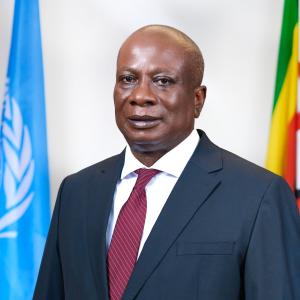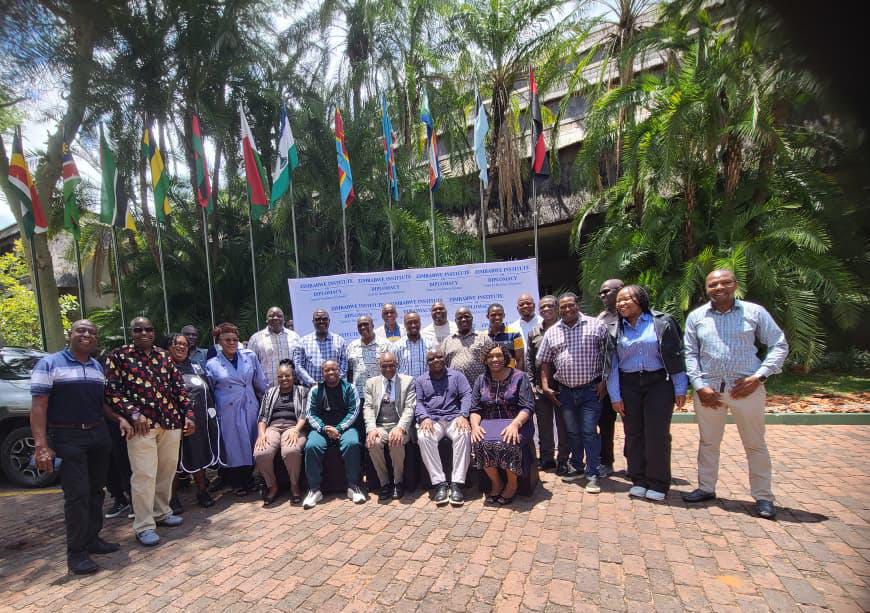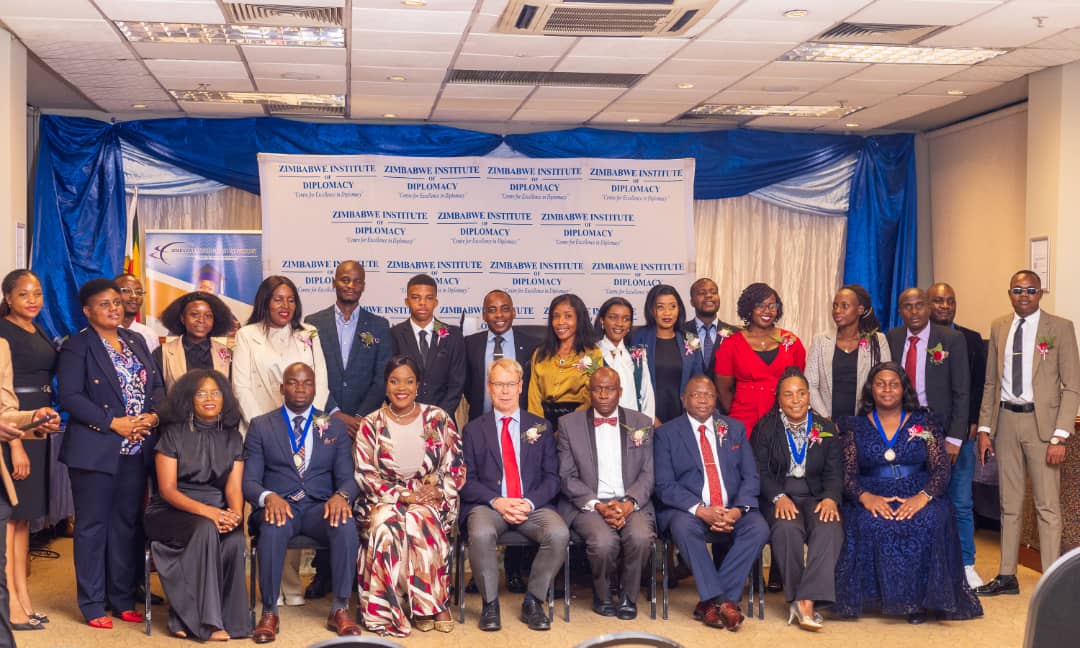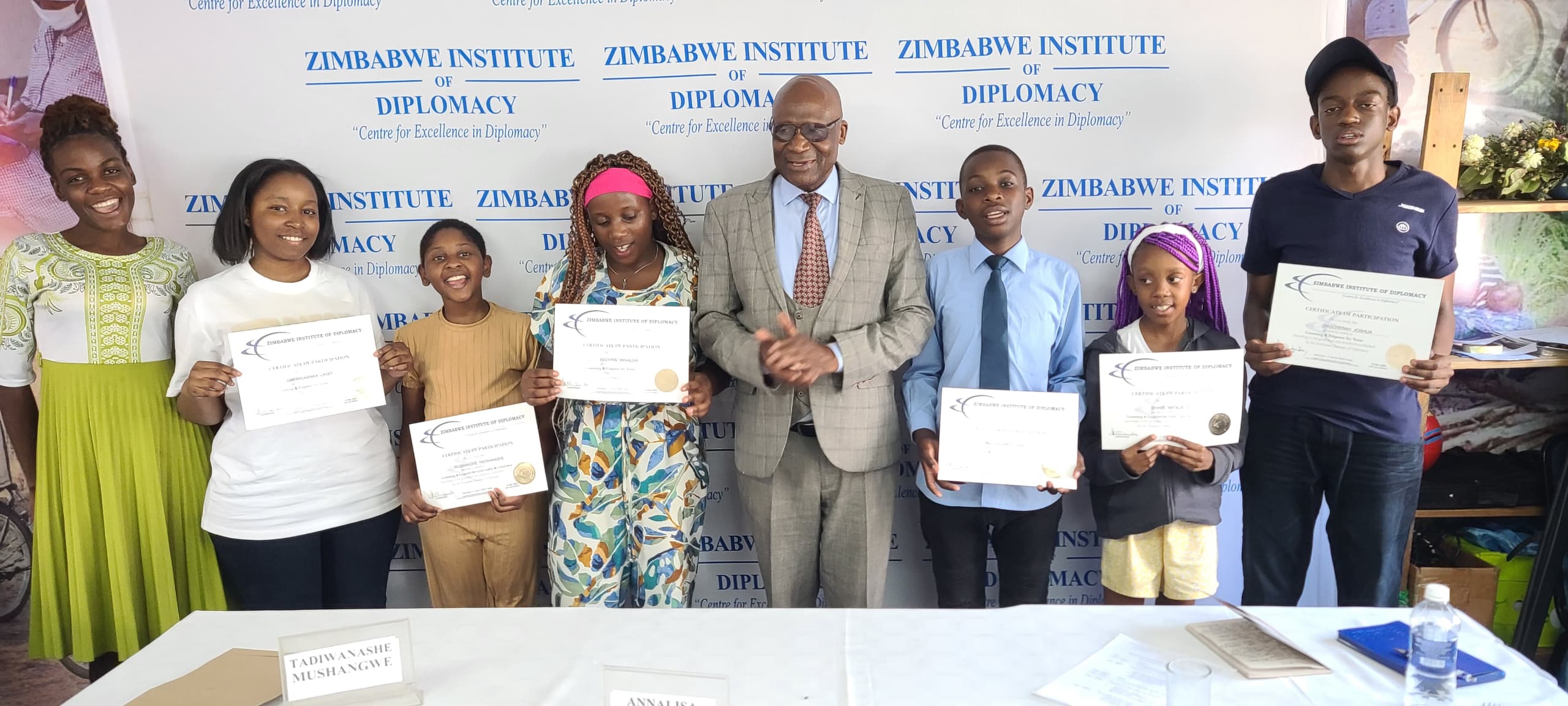18 July 2024, Harare – In a stirring lecture delivered virtually by Mr. Edward Kallon, United Nations Resident and Humanitarian Coordinator for Zimbabwe, the enduring significance of the United Nations in contemporary diplomacy and international affairs was passionately expounded. The event, hosted by the Zimbabwe Institute of Diplomacy (ZID), was attended by esteemed dignitaries, including Ambassador V. A. Chikanda, the Chairperson of ZID, alongside students and faculty members and other diplomats.
Mr. Kallon initiated his lecture by underscoring the critical importance of understanding the role of the United Nations in global governance. In a world fraught with conflict, humanitarian crises, and environmental challenges, the UN stands as a beacon of hope and a platform for international cooperation. Kallon posed a thought-provoking question: “What would the world look like without the UN?” This exercise in imagination highlighted the potential chaos and fragmentation a world without this cornerstone of global diplomacy might face.
United Nations: From Conception to Contemporary Impact
Founded in 1945 in the aftermath of World War II, the United Nations was conceived as an audacious gamble—a symbol of hope for a war-torn world. The UN’s historical background was detailed, showcasing its initial objectives of maintaining international peace and security, fostering friendly relations among nations, and promoting social progress and human rights.
Today, the UN operates with the same principles but faces a myriad of contemporary challenges. Through peacekeeping missions, the Security Council’s sanctions and diplomatic efforts, and the enforcement of international laws through the International Court of Justice (ICJ), the UN plays a pivotal role in preventing conflicts and facilitating peace. The adoption of the Sustainable Development Goals (SDGs) in 2015 illustrated the UN’s commitment to addressing pressing global issues such as climate change, poverty, and human rights.
A World Without the UN: A Grim Scenario
Mr. Kallon painted a hypothetical scenario of a world without the UN to emphasize its importance. In this dystopian vision, the absence of a central body for diplomacy, humanitarian aid, human rights, health, and environmental protection would lead to a fragmented, conflict-prone, and less equitable world. The lack of a unified approach would result in significant gaps and inefficiencies, ultimately impacting global stability and the well-being of populations worldwide.
The UN’s failure might give rise to:
- Increased escalation of conflicts without neutral mediation.
- Greater coercion by powerful countries over weaker ones.
- Formation of rival alliances, potentially leading to new cold wars or arms races.
- Fragmented humanitarian efforts with reduced effectiveness.
- More widespread human rights abuses without a central body for accountability.
- Disjointed responses to global health crises.
- Weaker international agreements and commitments to combat environmental degradation.
The UN’s Indispensable Contributions
Mr. Kallon illuminated the tangible impact of various UN organs:
- General Assembly: A forum for deliberation and policy-making among 193 member states, addressing global challenges such as COVID-19, climate change, and inequality.
- Security Council: Maintaining international peace and security with 15 members, including five permanent ones, engaging in peacekeeping missions worldwide.
- International Court of Justice: Settling legal disputes between states and providing authoritative interpretations of international law.
- Economic and Social Council: Advancing the 2030 Agenda for Sustainable Development, addressing extreme poverty, and fostering global development.
- Secretariat: Administering the UN’s daily work under Secretary-General António Guterres, from conflict mediation to climate action.
- Specialized Agencies: WHO’s management of global health crises, UNESCO’s promotion of global education, and ITU’s enhancement of global cybersecurity.
Shaping the Future of International Relations
Reflecting on the contemporary relevance of the UN, Mr. Kallon emphasized its pivotal role in peace and security, human rights protection, sustainable development, global health, and climate change mitigation. The UN’s peacekeeping missions, human rights advocacy, and orchestrated responses to health crises underscore its indispensable nature.
The UN’s establishment of international norms and laws, such as the ICC and the Paris Agreement, has profoundly shaped the conduct of states globally. The Sustainable Development Goals (SDGs) form a blueprint for achieving peace and prosperity, and despite progress, significant challenges remain. For instance, over 124 million people were pushed into extreme poverty due to recent global upheavals.
The Path Forward: Multilateralism and Cooperation
Winding up his lecture, Mr. Kallon called for critical thinking about the UN’s role and effectiveness as an organization striving for global peace and cooperation. He acknowledged the need for reforms and emphasized the UN’s mission to foster a more peaceful, just, and sustainable world.
The upcoming Summit of the Future promises to be a pivotal event in enhancing international cooperation and multilateralism. As member nations grapple with the challenges of climate change, artificial intelligence, outdated financial structures, and geopolitical tensions, the Summit will focus on elevating the UN’s role in navigating these complexities.
Mr. Kallon’s lecture reaffirmed the United Nations’ indispensable role in contemporary global affairs. The thought experiment of a world without the UN underscored its profound impact on peacekeeping, humanitarian aid, human rights, and environmental protection. As the world faces unprecedented challenges, the Summit of the Future offers a beacon of hope—a platform for nations to enhance international cooperation and reinforce the principles of multilateralism.
Through collective action, the UN continues to shape a better world, providing hope out of despair, and striving for a sustainable and equitable future for all. The United Nations, despite its imperfections, remains a cornerstone of global diplomacy, ensuring that the world strives towards peace, justice, and prosperity. The Summit of the Future may well be the key to unlocking a new era of international cooperation and multilateralism.




